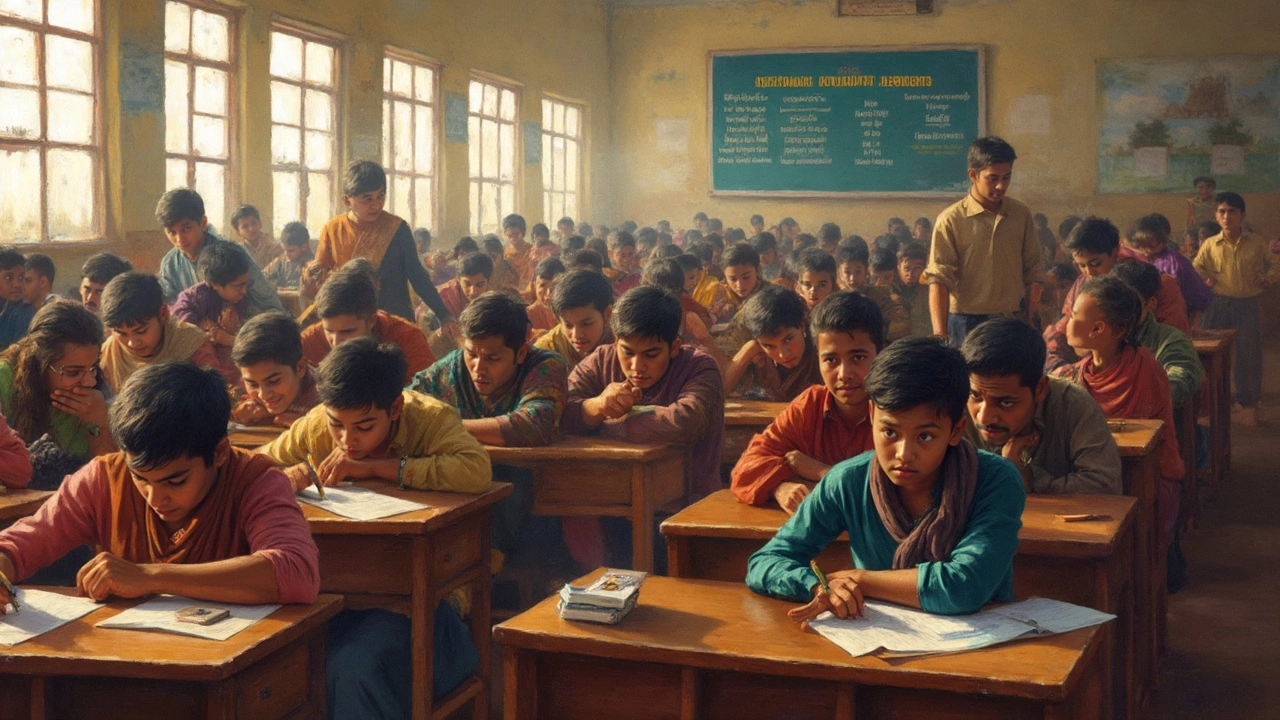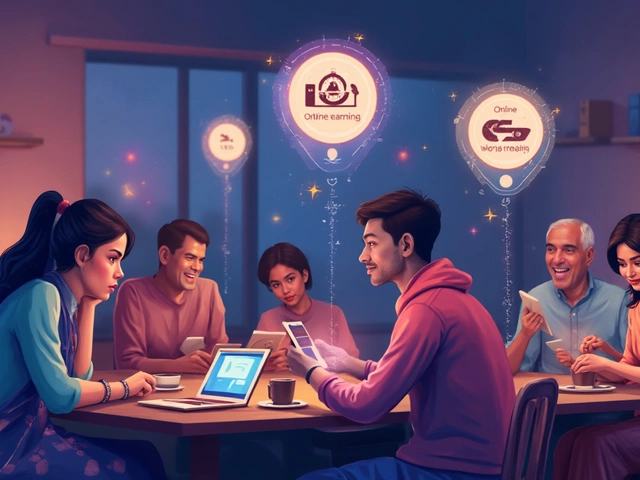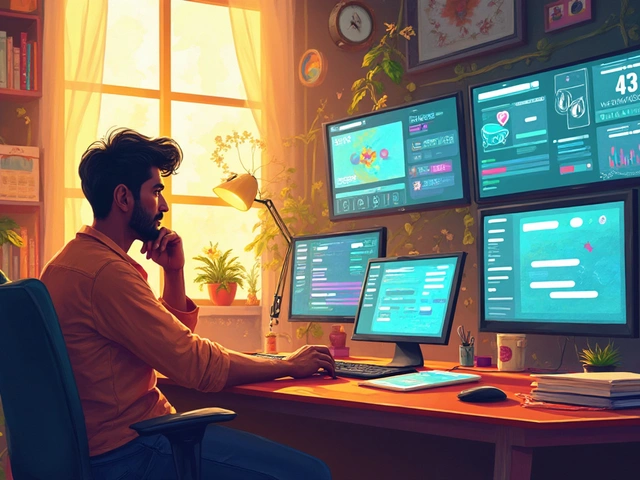
If you’ve ever tried for a government job, you know it’s not some walk in the park. Every year, millions fill out those forms hoping for stability, good pay, and respect. Sounds tempting, right? But how crowded is the race, and how do you know if you even stand a chance?
For a single position, sometimes over ten thousand people line up—the numbers can be jaw-dropping. Some government exams are harder to crack than top-tier private jobs, just because so many want that security and steady paycheck. It’s common for less than 1% of applicants to make the final cut. The odds can feel brutal, but they aren’t impossible—especially if you know how the game works.
Your background, the exam you pick, and how you prep all matter. Even small differences, like being in the right place at the right time, can turn the odds for or against you. But facts, numbers, and the right tricks in your pocket can make a huge difference. Ready to see what you’re really up against and how you could stand out?
- Why Are Government Jobs So Popular?
- Crunching the Numbers: Real Odds You Face
- The Main Hurdles in the Way
- Smart Ways to Improve Your Chances
- Stories from Successful Candidates
- Final Thoughts: Is It Really Worth It?
Why Are Government Jobs So Popular?
Ask anyone in India or neighboring countries, and you’ll hear the same reason: government jobs guarantee security. The private sector often goes through ups and downs—companies close, salaries get cut, and layoffs can happen with zero warning. Compare that to a government job where layoffs are almost unheard of and paychecks keep coming, even in tough times. No wonder families push kids toward these exams.
It’s not just about job safety. Perks are a huge part of the appeal. Government employees get fixed working hours, which means a better work-life balance. You don’t have to stay late or answer calls outside the office. Then there are benefits like pension (yes, that’s money for life), health insurance, paid holidays, and regular pay hikes linked to the 7th Pay Commission.
- No random transfers or firings without a solid reason.
- Loan and housing perks—banks trust government employees more, so home and personal loans are easier to get, usually at better rates.
- Respect in the community. It’s funny but true: in many places, being a ‘Sarkari’ employee gets you way more social points than any IT job.
Here’s a snapshot of why people line up in the lakhs for a single opening:
| Perk/Reason | Private Sector | Government Job |
|---|---|---|
| Job Security | Low to medium | Very high |
| Salary Hike Pattern | Performance-based | Time-bound (Pay Commission) |
| Retirement Benefits | PF / Gratuity (if any) | Pension + PF + Gratuity |
| Medical Benefits | Basic/variable | Covers whole family |
| Work Pressure | Often high | Usually moderate |
Even now, competition for every government job chance hasn’t dropped. In 2024, the SSC CGL exam got over 30 lakh applicants for around 7,500 seats. Same goes for banking and railways, which pull in huge numbers.
So, the hype’s not slowing down. The steady money, lifelong perks, and the badge of respect keep these jobs super attractive year after year.
Crunching the Numbers: Real Odds You Face
If you want a clear picture, let’s check the numbers around popular government exams. It’s not just a few friends or neighbors gunning for the same post—sometimes it’s entire towns. For bigger exams like SSC CGL, UPSC Civil Services, Railway Group D, or Bank PO, the competition isn’t just stiff—it’s wild.
| Exam | Applicants (Latest Year) | Vacancies | Selection Rate |
|---|---|---|---|
| UPSC Civil Services (CSE) | ~1 million | ~1,000 | 0.1% |
| SSC CGL | ~3.5 million | ~35,000 | 1% |
| Railway Group D | ~17 million | ~1,03,769 | ~0.6% |
| IBPS PO | ~5 million | ~4,300 | 0.09% |
Look at those odds: less than 1% for nearly all major exams. So when you hear that getting a government job chance is slim, that’s not an exaggeration. Out of every hundred people applying, barely one actually makes it to the final list.
It’s also worth noting, the exact odds depend on the post, category (like General, OBC, SC/ST), disability quotas, and sometimes even your home state. Some posts see even crazier competition—think over 20,000 people fighting over just 10 seats, especially for high-profile or easy-entry positions.
- UPSC: One of the toughest—over 99.9% get knocked out each year.
- SSC CGL: Even with more seats, the giant application pool means 99 out of 100 don’t make it.
- Railways: Attracts freshers and those from rural backgrounds, so expect the biggest crowds.
Don’t let the numbers freak you out, though. Some exams have several stages—prelims, mains, interviews. Most people drop out after the first stage because they come unprepared or underestimate the process. Knowing these odds makes it clear why a focused preparation plan matters so much.
The Main Hurdles in the Way
Getting a government job isn’t just about filling out an application and showing up on exam day. You’re up against real obstacles that filter out thousands of people at every step.
First, look at the sheer numbers. In 2023, the Staff Selection Commission CGL exam got nearly 21 lakh applications for around 7,500 posts. That’s less than a 0.4% selection rate. Let’s break down what makes these odds even tougher:
- Fierce competition: Everyone wants the job, so the talent pool is massive. Many applicants have years of dedicated prep behind them.
- Complex selection process: Most exams have multiple rounds—prelims, mains, interviews, sometimes even physical or skill tests. One slip can send you packing.
- Changing patterns: Syllabus, paper pattern, and even the number of vacancies change every year. No two attempts look quite the same.
- Reservation and quotas: Different posts have cutoffs for various categories. Sometimes, an open category candidate faces stiffer competition for less seats.
- Time crunch: Many candidates juggle studies with work or college. Keeping up momentum and managing stress is a real struggle.
- Limited attempts/age limit: Some exams cap how many times you can try, or require you to be under a certain age.
Here’s a quick look at how some popular exams stack up on government job chance:
| Exam Name | Applicants | Posts | Chance (%) |
|---|---|---|---|
| SSC CGL 2023 | 21,00,000 | 7,500 | 0.36 |
| IBPS PO 2023 | 7,00,000 | 3,800 | 0.54 |
| UPSC CSE 2023 | 11,00,000 | 1,100 | 0.10 |
| RRB NTPC 2021 | 1,25,00,000 | 35,281 | 0.28 |
Another major hurdle is outdated or wrong study material. Out of date books, half-baked online courses, and myths spread on social media waste precious preparation time. Then there’s the mental pressure—dealing with rejection, family expectations, and the fact that every mistake costs you months, sometimes years.
All these hurdles are real, but knowing them means you can dodge mistakes early. The more you understand the battlefield, the more you can plan a smarter attack.

Smart Ways to Improve Your Chances
If you’re serious about snagging a government job, just filling out the form isn’t enough. You need a plan that actually works in the brutal competition. Here’s what makes a real difference.
- Government job chance depends heavily on how you handle your prep time. People who follow a set timetable for studying perform way better. Don’t just read random stuff; make a daily routine and stick with it like clockwork.
- Pick the right study material. Government exams recycle questions and stick to certain formats. Use official syllabi, old question papers, and the latest mock tests. For most banking and SSC exams, successful candidates swear by previous years' papers and top-rated guides like NCERT books for basics.
- Focus on speed and accuracy. Many government exams punish wrong answers with negative marking. Practice mock tests to not only get answers right but also finish fast. Apps for timed quizzes can turn practice into a habit.
- Stay updated on current affairs—questions pop up every year, especially in UPSC and state public service exams. Reading a good daily news source and making short notes can push your score past the cutoff.
- Join a study group or online forum. Everyone has gaps in their knowledge. Discussing tricky topics with others exposes you to shortcuts and tips you might miss alone. Telegram, Reddit, and even small local WhatsApp groups can help.
- Don’t get stuck on Plan A. If a big exam doesn’t pan out, look for smaller or lesser-known departments. Plenty of candidates land solid careers in roles like clerks, assistants, and state boards, not just high-profile jobs.
Relying on luck is pointless with government jobs. Stick to a strategy, measure your progress, and tweak what’s not working. That’s how you shift the odds closer to your side.
Stories from Successful Candidates
Real people make real breakthroughs—even when the numbers look scary. Let’s dig into what toppers and recent recruits have shared, straight from their own experiences.
Take Pooja Sharma, who cracked the SSC CGL in 2024. She spent 8 to 10 hours a day juggling old papers, mock tests, and a buddy group for doubt-busting. Pooja swears by building a tight routine and sticking to it, even during down days. In her words, testing yourself weekly builds the stamina for marathon exams—not just quick wins.
Then there’s Rohit Singh, who made it to the IAS in his third try. Rohit says it’s not about being a genius. He focused on smart revision, recent current affairs, and writing practice. He even shared his daily time block:
- 6:00 am – 2 hours of subject study
- Midday – 1 hour reading newspaper/current events
- Afternoon – 2 hours solving past questions
- Evening – Short break, then revision or group discussion
This routine meant less burnout and better recall under pressure.
Let’s look at the government job chance numbers, so you know what they faced:
| Exam Name | Applicants (2024) | Vacancies | Selection Rate |
|---|---|---|---|
| SSC CGL | 3.7 million | 18,000 | 0.5% |
| UPSC Civil Services | 1.1 million | 1,105 | 0.1% |
| Bank PO | 1.7 million | 10,000 | 0.6% |
Notably, a lot of successful folks mention joining a prep group—online or offline. Why? You get real feedback. You catch stupid mistakes early. That can be the thin line between getting stuck and moving to the next round.
Finally, almost every top performer says to never follow the crowd on strategy. Use toppers’ notes—but don’t just copy. Tweak the plan to fit your weak spots. That’s how you carve out your own edge in this crowded field.
Final Thoughts: Is It Really Worth It?
This is what everyone wants to know after facing the crazy competition, long prep hours, and unpredictable results—is a government job worth the grind? Let's keep it real.
Getting a government job isn't easy. Most big exams like SSC CGL, UPSC Civil Services, or State PSCs see less than 0.5% of applicants succeed. Take the UPSC: around 1 million fill out the form, maybe 10,000 clear prelims, but only around 700 get the final posting every year.
| Exam | Applicants | Final Selections | Selection Rate |
|---|---|---|---|
| UPSC Civil Services | 1,100,000 | 700 | 0.06% |
| SSC Combined Graduate Level | 2,500,000 | 11,000 | 0.44% |
| IBPS PO (Banking) | 6,000,000 | 4,000 | 0.07% |
The draw is obvious. These jobs offer security, regular income, respect, and solid benefits—stuff like health insurance, pension, and sometimes housing. For many families, one government job is a life-changer. Compare this to private sector jobs, where layoffs, contract work, and unpredictable growth are the norm. If you value long-term security, this can be a huge deal.
But let's not gloss over the downsides. The road to get there is tough. You might need years of dedicated study and possibly face failure multiple times. The work culture sometimes runs on old systems, which might feel limiting if you're used to creative or flexible work setups. Moving up can be slow. And sometimes, pay hikes can't match the fast track in private companies.
So, should you aim for a government job? Here’s when it makes sense:
- You want job security and stable pay, no matter market ups and downs.
- You’re ready to hustle for the tough exams, year after year if needed.
- Your family depends on stability, benefits, and perks like health care or a pension.
- You prefer predictable work routines over hectic private sector hours.
It’s worth reconsidering if:
- You value speed, creativity, or big pay jumps more than security.
- You don't want to spend years in preparation or repeat attempts.
- You find government work culture frustrating or too rigid.
At the end of the day, it’s about priorities and what you’re willing to trade for stability. For some, cracking a government job chance is a one-way ticket to a better life. For others, it might not be the only shot. Know your reasons, weigh the facts, and make the call that’s right for you.





